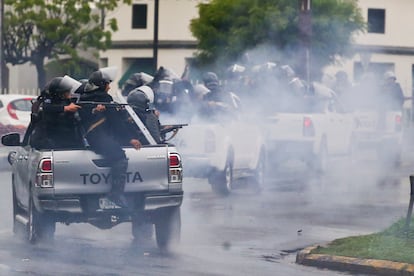Forty opposition figures arrested in Nicaragua as Ortega orders massive police raid
Political opponents, activists and journalists were detained and charged with crimes against the regime as part of a repressive strategy that seeks to force them into exile

Police raids carried out in Nicaragua on Wednesday saw opponents of the regime of President Daniel Ortega and his wife, Vice-President Rosario Murillo, detained across the Central American country. Political opponents, journalists and peasant activists were rounded up in the regions of Managua, Rivas, Matagalpa, Chinandega, Madriz, Estelí, Granada, Jinotega and Chontales, with opposition groups estimating that at least 40 people were arrested. This is the largest number of detentions registered on a single day in Nicaragua since the 2018 paramilitary operation known as ‘Operación Limpieza’ (Operation Clean-Up).
The arrested individuals faced court hearings late on Wednesday and in the early hours of Thursday morning, and have been accused of “conspiracy to damage national integrity and the spreading of false news”. According to several sources consulted by EL PAÍS, almost half of those targeted have been placed under house arrest, and will have to report to their nearest police station daily.
Among the most notable detentions is that of María de la Cruz Bermúdez, the mother of Richard Pavón, a student killed in mass protests against Ortega in April 2018. In the city of Rivas, a leader of the demonstrations against the regime’s failed inter-oceanic canal project, Octavio Ortega Arana, was arrested. Ortega Arana was led away by police on crutches; in mid-2022, he had a leg amputated due to problems with diabetes.
Coinciding with World Press Freedom Day, William Aragón, a journalist who formerly worked for the Nicaraguan newspaper La Prensa, was detained. Aragón was then placed under house arrest, with his computer and other electronic devices confiscated. In Matagulpa, the political opponent Ileana Velásquez was arrested; in Somoto, five citizens — Danelia Argüello, Xiomara Ruiz, Ruth Espinoza, Socorro Medina and Daniel Moncada — were intercepted as they left a Catholic church; and in Chontales, the peasant activist leader Teresa Mena was taken to the El Chipote prison, where conditions have been described by human-rights groups as cruel and inhumane.
Amid threats from the Nicaraguan authorities, not all those rounded up have made their arrest known, over fear of reprisals.
“The strategy of stamping out any trace of opposition, no matter how small, continues,” Félix Maradiaga, a former presidential candidate now living in exile, tells EL PAÍS. “They want to eradicate any form of local resistance, so that any foreign action against the regime has a lower impact within the country. The regime senses that major international pressure could be on the way, so they feel it’s important to snuff out any kind of expression of local resistance. There’s also the repression of the Catholic church. The regime knows that this religious persecution could heighten indignation among the citizens of a country where Catholic faith is widespread, so they carry out a policy of direct repression against people who, according to the regime’s dictatorial paranoia, could directly channel that civil discontent.”
New repressive strategy pushes opponents into exile
Opposition groups have condemned the mass detention and charging of individuals as a strategy adopted by the Nicaraguan regime to create an atmosphere of fear and force people into exile.
“They’re tracking activists, political opponents and human-rights defenders who are still in the country,” said a citizen-network source who is monitoring the situation in Nicaragua and, for security reasons, asked to remain anonymous. “What they’re doing is pushing people into exile in a new wave of terror.”
Many of those forced into house arrest are terrified and considering leaving Nicaragua, amid an environment of underlying danger in which court decisions are unpredictable. “Due process isn’t being followed,” says the lawyer Yonarqui Martínez, who received more than a dozen complaints from those arrested on Wednesday. “When they had their hearing, they weren’t allowed to have a lawyer of their choosing; they were kidnapped and taken before a judicial authority. Arresting people and taking them before a judge in the early hours of the morning for mass hearings is something we’ve never seen in the history of Nicaragua. Without a fair trial process, all the rights of the accused have been violated. Carrying out these mass arrests across several regions is a new strategy.”
After the regime exiled 222 opponents in February, police have set in motion the ‘revolving door effect’, a plan aimed at re-filling prisons with political prisoners. Before this week’s raid, the most notable detentions took place during April, five years on from the protests that shook the Ortega-Murillo administration. However, last month’s arrests, which totaled 21, were carried out in a staggered fashion.
Sign up for our weekly newsletter to get more English-language news coverage from EL PAÍS USA Edition
Tu suscripción se está usando en otro dispositivo
¿Quieres añadir otro usuario a tu suscripción?
Si continúas leyendo en este dispositivo, no se podrá leer en el otro.
FlechaTu suscripción se está usando en otro dispositivo y solo puedes acceder a EL PAÍS desde un dispositivo a la vez.
Si quieres compartir tu cuenta, cambia tu suscripción a la modalidad Premium, así podrás añadir otro usuario. Cada uno accederá con su propia cuenta de email, lo que os permitirá personalizar vuestra experiencia en EL PAÍS.
¿Tienes una suscripción de empresa? Accede aquí para contratar más cuentas.
En el caso de no saber quién está usando tu cuenta, te recomendamos cambiar tu contraseña aquí.
Si decides continuar compartiendo tu cuenta, este mensaje se mostrará en tu dispositivo y en el de la otra persona que está usando tu cuenta de forma indefinida, afectando a tu experiencia de lectura. Puedes consultar aquí los términos y condiciones de la suscripción digital.









































